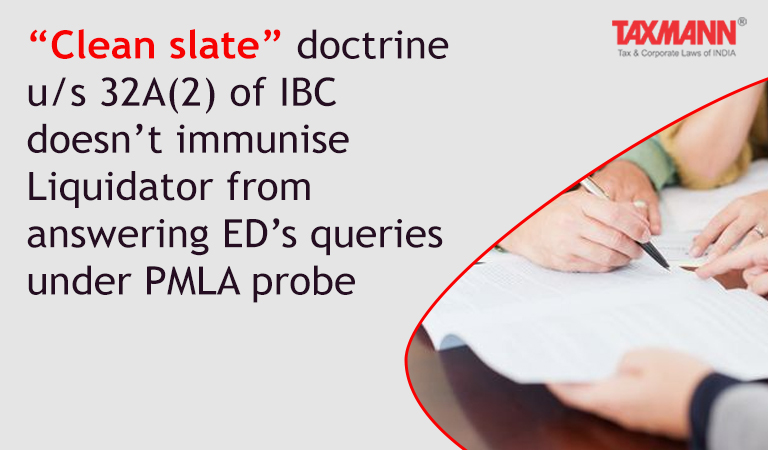“Clean slate” doctrine u/s 32A(2) of IBC doesn’t immunise Liquidator from answering ED’s queries under PMLA probe
- Blog|News|Insolvency and Bankruptcy Code|
- 2 Min Read
- By Taxmann
- |
- Last Updated on 18 December, 2021

Case Details: Nitin Jain Liquidator Psl Ltd. v. Enforcement Directorate - [2021] 133 taxmann.com 184 (Delhi)
Judiciary and Counsel Details
-
- Yashwant Varma, J.
- Kirti Uppal, Sr. Adv. Aditya Gauri, Amar Vivek, Ms. Riya Gulati, Ms. Maneesha Dhir, Ms. Varsha Banerjee and Kanishk Khetan, Advs. for the Applicant. Zoheb Hossain, Ms. Tulika Gupta, Advs. Neeraj Malhotra, Sr. Adv. R.P. Agrawal, Ms. Manisha Agrawal, Priyal Modi, Ujjaval Kumar and Nimish Kumar, Advs. for the Respondent.
Facts of the Case
In the instant case, the Delhi High Court held that Section 32A(2) of the Insolvency and Bankruptcy Code only protects the property of the corporate debtor in liquidation from provisional attachment by ED under section 5 of PMLA in respect of money laundering offences committed prior to commencement of CIRP. It does not make the Liquidator of corporate debtor immune from answering to the requests for information that may be directed towards him by the investigating authorities under the PMLA
High Court Held
The Court stated that Section 32A of IBC in unambiguous terms specifies the approval of the resolution plan in accordance with the procedure laid down in Chapter II as the seminal event for the bar created therein coming into effect.
The approval of the measure to be implemented in the liquidation process by the Adjudicating Authority must be held to constitute the trigger event for the statutory bar enshrined in Section 32A coming into effect. It must consequently be held that the power to attach as conferred by Section 5 of the PMLA would cease to be exercisable once any one of the measures specified in Regulation 32 of the Liquidation Regulations 2016 comes to be adopted and approved by the Adjudicating Authority(NCLT)
The expression “sale of liquidation assets” in section 32A(2) must be construed accordingly. The power otherwise vested in the respondent under the PMLA to provisionally attach or move against the properties of the corporate debtor would stand foreclosed once the Adjudicating Authority comes to approve the mode selected in the course of liquidation. To this extent and upon the Adjudicating Authority approving the particular measure to be implemented, the PMLA must yield.
From the date when the Adjudicating Authority came to approve the sale of the corporate debtor as a going concern, the cessation as contemplated under Section 32A did and would be deemed to have come into effect.
The Liquidator though obliged to administer and oversee the affairs of the corporate debtor in accordance with the provisions of the IBC, cannot strike a position of not cooperating with the competent authorities under the PMLA. Regard must be had to the fact that upon appointment, the Liquidator steps into the shoes of the erstwhile management and is the custodian of the properties. It would be necessary to recognize the obligation of the Liquidator to provide such material and other information that may be required.
The Liquidator cannot strike the position of being immune from answering to the requests for information that may be directed towards him by the investigating authorities under the PMLA.
Disclaimer: The content/information published on the website is only for general information of the user and shall not be construed as legal advice. While the Taxmann has exercised reasonable efforts to ensure the veracity of information/content published, Taxmann shall be under no liability in any manner whatsoever for incorrect information, if any.

Taxmann Publications has a dedicated in-house Research & Editorial Team. This team consists of a team of Chartered Accountants, Company Secretaries, and Lawyers. This team works under the guidance and supervision of editor-in-chief Mr Rakesh Bhargava.
The Research and Editorial Team is responsible for developing reliable and accurate content for the readers. The team follows the six-sigma approach to achieve the benchmark of zero error in its publications and research platforms. The team ensures that the following publication guidelines are thoroughly followed while developing the content:
- The statutory material is obtained only from the authorized and reliable sources
- All the latest developments in the judicial and legislative fields are covered
- Prepare the analytical write-ups on current, controversial, and important issues to help the readers to understand the concept and its implications
- Every content published by Taxmann is complete, accurate and lucid
- All evidence-based statements are supported with proper reference to Section, Circular No., Notification No. or citations
- The golden rules of grammar, style and consistency are thoroughly followed
- Font and size that’s easy to read and remain consistent across all imprint and digital publications are applied



 CA | CS | CMA
CA | CS | CMA
